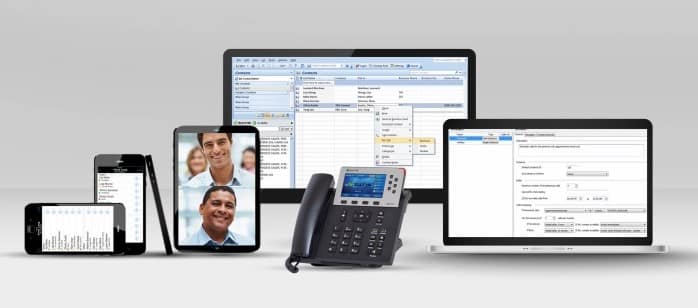You don’t have a landline at home, so why have one in the office? According to the latest research, only 6.5% of US residents rely exclusively on landlines for their telephone needs. Most businesses have at least moved over to private branch exchange (PBX) phone systems, but these systems have some serious limitations compared to voice over IP (VoIP) phone systems.
VoIP phone systems allow you to handle calls over your internet network rather than through a dedicated landline. And unlike digital IP PBX, phones on VoIP systems can communicate directly with computers, mobile devices and other computing equipment. And that comes with some serious advantages, for both your team’s productivity and your IT budget.
That computer-to-phone collaboration simplifies communications in enterprise-level businesses, making it much easier to keep in touch across multiple locations. That’s because VoIP is a lot more than just a call system. With online user management portals and integrated unified communications services, your potential for streamless, pain-free communication is as unlimited as your capacity for growth.
Customizable User Templates
One of the chief benefits of VoIP phone systems for enterprise-level businesses is the ability to easily add and remove users and manage phone lines. A large company might easily hire hundreds of new employees a year, and each new hire needs their own phone line. With VoIP, teams can easily manage user profiles through an online web portal, relieving some of the pain of employee onboarding.
That portal also allows users to customize user privileges. For instance, you might block international calling permissions for some users, or allow others to listen in on phone calls or change their location. Enterprise VoIP phone allows you to manage user settings at a highly granular level, giving you much more control over employee access.
Interactive Voice Response
Even a 10-person operation seems like a Fortune 500 company with this feature. Interactive voice response (IVR) directs callers to a professional, automated menu. Callers always receive a polished response, even after business hours.
IVR also enables you to have teams answer calls remotely so your professional presence never takes a backseat. In fact, you can even have remote callers appear to be working out of your main branch by adjusting the caller ID location for each user.
Call Forwarding
Experts say Americans spend about 5.75 hours a day working at their desks. What are they doing the other part of their time? Going to meetings, attending conferences and working remotely, which means they aren’t always sitting beside the phone.
One of the most useful functions of enterprise-level VoIP is the ability to forward calls to any number, which means you don’t have to be in the office to receive important communication. Likewise, when that big project deadline is looming and you need to work uninterrupted, you can turn on voicemail forwarding to automatically direct calls to your inbox. If that isn’t a perk of enterprise VoIP, we don’t know what is!
Software Integration
Perhaps one of the most useful features, however, is the ability to integrate VoIP functions with other communication tools. Unified communications platforms, which can be bundled into many enterprise phone systems, do the work of several different programs, like chat clients, video conferencing and web presentation services.
Since VoIP functions are fully integrated into these tools, users can easily launch a web conference from a chat, say, or be notified by email when they have a new voicemail message. In this way, VoIP reduces the duplicated effort that results from these functions being handled with separate applications. That’s a huge win for your team’s productivity.
Inexpensive Long-Distance Calling
You don’t have to pay long-distance charges when you call with your cell phone, right? Our point exactly. Enterprise-level VoIP phone systems let you avoid expensive long-distance charges when placing domestic calls, and enjoy reduced expenses when calling across the globe.
That makes it an incredible asset for multi-location businesses, especially if you have teams working in other offices or off-site. It also means phone systems are responsive — allowing you to reroute calls to other locations in response to unforeseen events. For instance, you might temporarily move calls to a different site while your main branch moves offices, or reroute calls to a satellite office through your main location while that area recovers from a weather event. It’s business as usual, no matter what the elements decide to dish out.
Just how much can VoIP save your business? Contact us today for an estimate!

